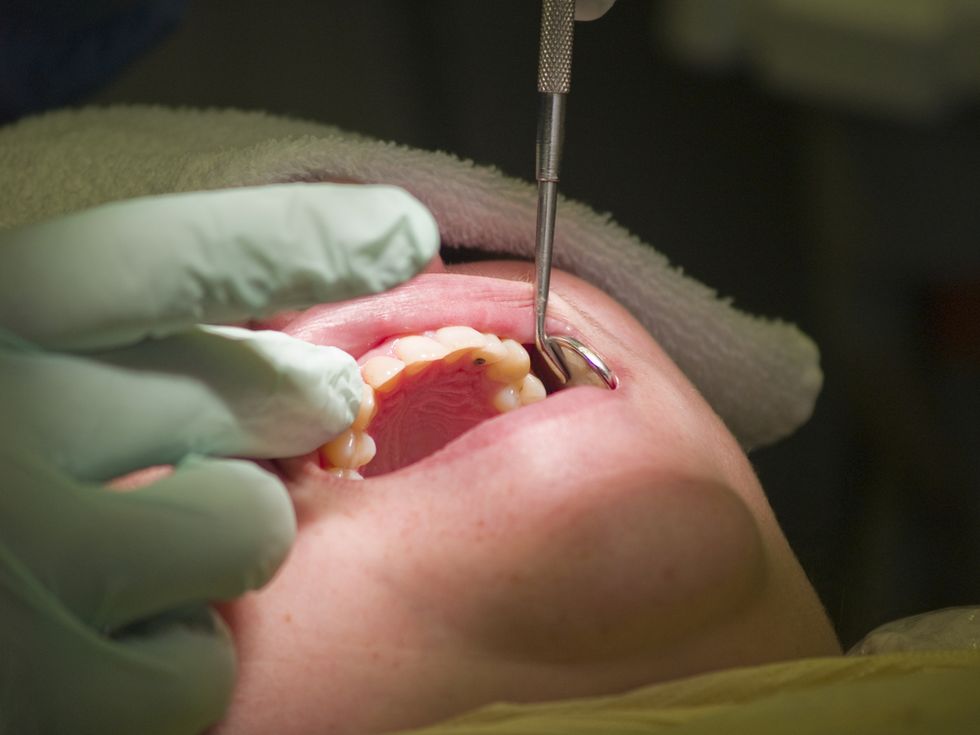
Photo credit: Shutterstock

A root canal is an unpleasant experience, but imagine waking up every day thinking that you'll be enduring this type of dental procedure.
In a unique case study, Dr. Gerald Burgess, a clinical psychologist with the University of Leicester in the U.K., described how a 38-year-old man lost his ability to make new memories after he received a local anesthetic for a root canal 10 years ago.
Since then, the man with anterograde amnesia has only been able to remember about 90 minutes at a time and every day thinks it's the day of his scheduled root canal. The study published in the journal Neurocase this week is reminiscent of movies like "Fifty First Dates," "Groundhog Day" and "Memento."
The patient was otherwise still able to remember his identity and had the same personality. According to a news release from the university, he uses an electronic diary and has prompts to help him remember his daily life.
Burgess along with his study co-author Bhanu Chadalavada, a psychiatrist at Northamptonshire Healthcare Foundation NHS Trust, wrote that at the time of the initial procedure the patient was fit and healthy. He joined the military at 17 years old, served in the first Gulf War and married at 22 years old.
He has no previous history of psychiatric disorders and his family doesn't have a history of mental illness, though his grandfather had dementia. As for prior physical injuries, the study reported that he had a minor back injury in 1989.
After his root canal, the study noted that the patient was "pale and faint" and could not sit or stand well by himself. He was reported to seem "vacant" and had "slow speech" at the time. The doctors believed he experienced a vasovagal reaction, which caused him to appear faint and provided treatment, but when his condition didn't improve, he was taken to a hospital.
Over the course of the next month, the patient's short-term memory only lasted 10 minutes. Over time, it improved to a 90-minute span.
"Though over the years [the patient] has implicitly adjusted to his circumstances to some extent, in general each morning he is surprised to wake up in his mother’s house," a place his family moved back to after his memory loss incident, the study authors wrote. "He wakes up believing that he should still be in the military, stationed abroad. Every day he thinks it is the day of the dental appointment.
"Through prompting by his wife, [the patient] checks his computer each morning on which they have listed (and keep updated) key facts he should be aware of. Some events that have occurred since the onset of his condition in March 2005 continue to elicit genuine surprise or astonishment each time he sees or hears about them, such as the marriage of some family friends or that a family pet has since passed away," they continued.
Burgess said in a statement that "we had never seen anything like this before in our assessment clinics, and we do not know what to make of it, but felt an honest reporting of the facts as we assessed them was warranted, that perhaps there will be other cases, or people who know more than we do about what might have caused the patient’s amnesia."
Burgess went on to say that this man's case shows that physicians that profound amnesia can occur without visible damage to the brain and without the onset of traumatic psychological events.
He did, however, provide a theory.
"An acquired or manifest deficiency of protein synthesis, required for permanent re-structuring of synapses in the brain, seemed an intriguing speculation, and one we hope there might be further human research into," he said of a possible cause for the inability to store new memories for the long term. "This speculation was sparked by two seemingly key coincidences of one, timing when this protein synthesis stage occurs coincides with the patient’s forgetting at 90 minutes or thereabouts, and two, both ‘episodic’ and ‘procedural’ memories appear to require successful protein synthesis to occur for long-term memory permanence, and the patient cannot retain any new either episodic or procedural memories – and this is unusual compared to traditional cases of amnesia."
Though the patient might think he's about to have a root canal every day before he's told otherwise, Burgess does not think the actual procedure or the anesthetic a decade ago are accountable for his memory issues.
"I feel the story lies elsewhere, but that the preceding incident needed to be documented and not ignored," he said in a statement.
Going forward, Burgess said he hopes other people with anterograde amnesia come forward so more research and theories can be discussed.
Though it doesn't appear there is any treatment to reverse this man's condition at this time, the patient, identified in some recent media reports only by his first name William, told BBC that he someday hopes to regain his ability to make new memories and hang onto them.
"I want to walk my daughter down the aisle and remember it," he said. "Should they become parents, I would like to remember that I have grandchildren, and who they are."
(H/T: Science Daily)
—
Front page image via Shutterstock.